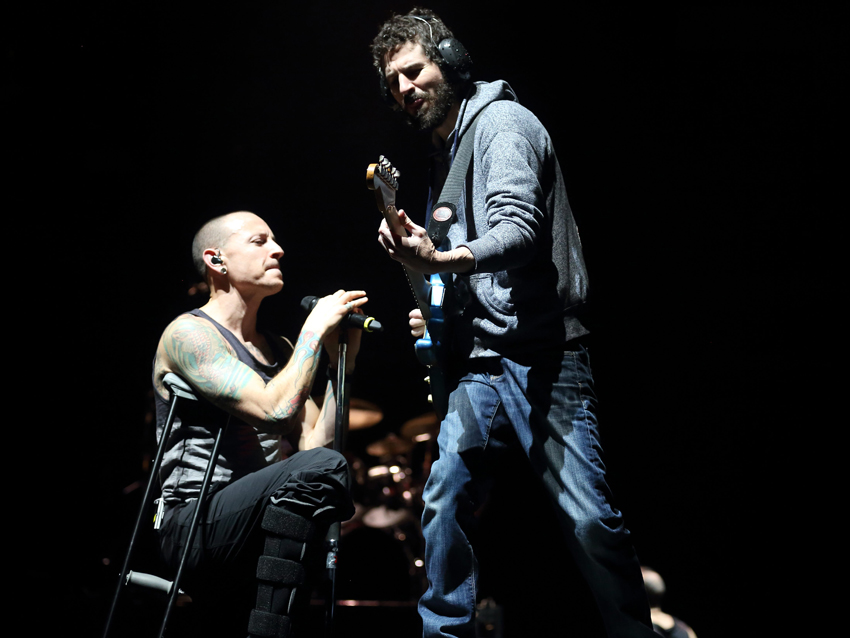
Brad Delson's top 5 tips for guitarists
Linkin Park guitarist Brad Delson admits that he doesn't get stuck in musical ruts too often, but when he needs to shake up his creativity, he looks to the arts for inspiration. "It can come from a variety of sources," the six-string star explains. "It could be listening to an album I love, or it could be looking at a painting or reading something that stirs the senses. A lot of times I don't need to actually be holding a guitar to discover something that fuels my playing."
As Delson descibes it, exposing himself to other forms of art allows him to glean a sense of honesty from their creators, which he then channels back to his own music-making pursuits. "Whether the artist has taken two disciplines and combined them in a new way, or if it’s something unresolved and it forces me to ask questions – it’s all part of the artistic conversation," he says.
"What's particularly exciting and rejuvenating is that moment when you can take those feelings and bring them to whatever you’re doing, like your guitar playing. It just fuels your creativity. Not that you’re looking to imitate or regurgitate, but you’re looking for your own artistic solutions and challenging yourself to innovate. I never get tired of that feeling, because it's always new in some way."
On the following pages, Delson runs down his top five tips for guitarists. Linkin Park's latest album, The Hunting Party, can be purchased at the Linkin Park Official Store, or on Amazon and iTunes.

Scales, scales, scales
“Pentatonic, diatonic, chromatic – scales are your best friends. Spend time with them every day. Scales are building blocks for playing the guitar and even understanding music.
“In my case, I've practiced scales so much that they became second nature – and became integrated into my playing. Music flows from scales in much the same way that language flows from words. It's a part of communicating.
“As a manual warm-up, too, for pure dexterity and loosening up the muscles, scales are great. Whenever I need to get the fingers moving and get limber, especially before a performance, I’ll go through scales. So familiarize yourself with as many scales as you can and watch how they open up your writing and your playing."

Know the theory
“Whether you're building a chord or an entire song, your fundamental understanding of music theory will light your path. If you have the fundamentals down, you always have a foundation to fall back on or build upon.
“Theory is grounding. If you’re trying to figure out how to marry a chord with a melody or a harmony, or even if you’re just trying to understand how to put a chord progression together, having a basic understanding of music theory is a must.
“I use the words ‘light your path’ because theory illuminates what you’re doing and why it all works. Accidents, instincts and spontaneity are essential to creating music – and all art, really – but you can’t rely on happenstance and luck all the time. So try to familiarize yourself with music theory. Like anything, it’s good to know what works with what… and why.”

It's all about the song
“Technical virtuosity is a huge asset, as long as it serves the song. When in doubt, remember content is king and form follows function. The simplest way to say something is usually the most powerful.
“I know that the most technically proficient drummers are also the most tasteful and subtle. Take session guys – you always hear ‘This guy is the number one studio drummer in the world,’ but then you'll find that his whole thing is about being in the pocket, serving the groove and letting the song happen.
“One thing we really learned from working with Rick Rubin is that you can’t build a house without having a strong foundation and frame. Only after you’ve created that foundation – the actual form – can you start to decoratively paint the walls and put in the ornamentation. Start out with a rich, honest statement – a great song. After that, anything else you add – the playing, the production, whatever – will hopefully enhance what listeners get out of it. But all the adornments are in service to the song; it’s not the other way around.”

Music is a team sport
“While honing your craft is essential, practicing on your own can only get you so far. Collaboration is a must. So find yourself some co-conspirators and turn your melody into harmony.
“Being part of a band means being a great teammate – just like in sports. You’ll never realize individual success if you can’t learn to work effectively within a team. Collaborating with other people in a band means complementing what they do, reacting to them; it means knowing when to play and when not to. It means being a great partner. It can be an incredible lifelong journey, but it starts with finding a friend and jamming.”

Let it flow
“If it's not fun, you're not doing it right. Music is a constant source of inspiration, provocation, unification. Whether it's melancholy, celebratory or furious, music has a unique ability to rouse our spirits. So leave your uptight perfectionism at the door, and let your joy lead the way.
“Although I loved the movie Whiplash and the questions it posed, like ‘What does it take to achieve greatness?’, I don’t think greatness requires masochism or a crazy pursuit of perfection. Greatness requires openness and having the ability to let something flow, no matter what emotion is driving it. Don’t overthink it. Let it happen naturally.
“This is different from preparation, like in steps 1 and 2, learning scales and music theory; but once you get some of the fundamentals down, it’s all about letting go of your expectations and sharing the moment with others. And if that’s not fun, I don’t know what is.” [Laughs]
Joe is a freelance journalist who has, over the past few decades, interviewed hundreds of guitarists for Guitar World, Guitar Player, MusicRadar and Classic Rock. He is also a former editor of Guitar World, contributing writer for Guitar Aficionado and VP of A&R for Island Records. He’s an enthusiastic guitarist, but he’s nowhere near the likes of the people he interviews. Surprisingly, his skills are more suited to the drums. If you need a drummer for your Beatles tribute band, look him up.
